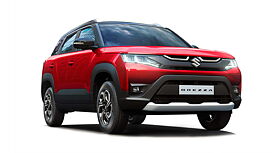Why would I buy it?
- Gets segment-leveling features
- Cabin space
- Ease of driving
Why would I avoid it?
- ZXI/ZXI+ variants expensive
- Engine lacks mid-range punch
Summary
The sub-four metre SUV category is currently one of the hottest segments when it comes to cars in India and there is a model from almost every mass-market player. The Vitara Brezza has been around since 2016 and received a facelift back in 2020. With the rising competition and a slew of updates from rival brands, the Vitara Brezza has a fair bit of catching up to do.

Although the new Maruti Brezza (yes, the Vitara moniker has now been dropped) is based on the same platform as the outgoing version, the company has heavily updated the new model you see in the images here. It is not just a mild facelift but a substantial change, be it the design, the features, or the new transmission. Will the new Brezza continue its high sales momentum with this update? Let’s find out.
Engine and Performance
7 / 10

At the heart of the new Maruti Suzuki Brezza is a 1.5-litre, four-cylinder, K15C, naturally aspirated petrol engine that produces a maximum power output of 102bhp and 136.8Nm of torque. This engine is paired with a five-speed manual unit and a six-speed torque converter automatic unit. This review focuses on the manual variant, and you can watch our review of the automatic variant above. Puttering around the city is pretty easy with the Brezza, and this is what exactly Maruti has aimed for with respect to the tuning. In stop-and-go traffic, there are oodles of low-end torque on offer and at low to medium speeds, this engine is very tractable. It doesn't judder or feel like it's strained when close to idling RPM.

Out on the highway, the car asks you to shift early in lieu of returning a higher fuel efficiency. Up-shifts are recommended by the system around the 2,000rpm mark via the gear-shift indicator on the MID. Out on the wide open roads the Brezza is happy to cruise at speeds of 100kmph, but you would need to down shift for overtakes. The NVH seems to be pretty good when the engine is relaxed, it’s only when you start pushing the car that the engine noise filters into the cabin at 3,500rpm, which isn’t exactly intrusive if you like the sound of an internal combustion engine.

Hill-hold assist, commonly known as hill hold control, is now offered as standard across the variant line-up of the Brezza. Coming back to hill hold assist, this nifty feature holds the car in the same position for three seconds while the driver juggles between the accelerator, brake, and clutch pedals.
Ride and Handling
7.5 / 10

In terms of steering response, it is light enough for everyday usage, although with the rise in pace, it weighs up adequately. The suspension, according to Maruti, has seen a minor revision in terms of tuning due to the additional weight of 40 kgs the car has put on, courtesy of the new feature set. Over undulations and almost non-existent patches of tar and concrete that we call roads, the Brezza keeps its passengers in comfort on most occasions, with the rare chance that a pothole finds its way to unsettle the occupants of the car. Body movement isn’t quite evident either, and the car feels fairly planted even at triple-digit speeds.
Comfort, Convenience, and Features
7.5 / 10

Step inside the Brezza and you are welcomed by a dual-tone upholstery theme of brown and black, which, apart from standing out in the sea of beige and black themes, gives the car a rather rich feel. The first thing that grabs one’s attention would be the new floating nine-inch SmartPlay Pro touchscreen infotainment system. Nestled on top of the new centre console, which by the way, borrows the design of the buttons from the new Baleno, the infotainment system is larger than the outgoing model by two inches. The overall quality of the interiors are on par for the segment, but the material and quality of plastics used around the AC vents could have been better.

Another welcome addition is the new flat-bottom steering wheel, and placed behind the revised instrument cluster is a Head-Up Display (HUD), which also made its debut in the new Baleno. On the other hand, what does make its debut on the Brezza when it comes to Maruti Suzuki’s entire line-up though, and is the party trick for a good number of folks out there, is an electric sunroof.

A few other notable features that add convenience for Brezza owners include a 360-degree camera, an auto-dimming IRVM, wireless charging, a cooled glove box, ambient lighting, cruise control, automatic climate control, OTA updates, and Suzuki Connect telematics. In terms of safety, ESP is standard across the variant line-up, while six airbags are limited to the top-spec ZXi Plus variant. A few other notable safety features include height-adjustable front seat belts, a rear view camera, a high-speed alert system, a seat-belt reminder system, a rear defogger, an impact-sensing door-unlock function, and an auto-dimming IRVM. A glaring omission in the SUV regarding features was the lack of ventilated seats, which was noticed in the sunny weather of Chennai that hosted us as we tested the car. We can imagine how much we’d miss this feature in the humid weather of Mumbai during peak summers.

Coming to the utility, there are bottle holders on every door as well as the centre console, and all of them can hold a one-litre bottle each. There is also a front arm-rest with storage function, but don’t expect the latter to hold much excluding small knick-knacks like a wallet and a medium-sized smartphone. The second-row occupants get a separate set of AC vents behind the front arm-rest, which also houses two USB charging ports, where one is a Type-C slot. Neat addition there Maruti, and we really appreciate the thought behind this. Also on offer is a folding arm-rest with two cup-holders, should the rear occupants feel the need to indulge in a cuppa on the go.
Exterior Design
7 / 10

Compared to the outgoing model, the 2022 Maruti Brezza gets a new fascia, replete with new bumpers, grille, and headlamps. The new single slat grille, with its matte black finish and Y-shaped design on either side, makes the fascia rather chunky. The headlamps are entirely new, with dual L-shaped LED DRLs and LED projector headlights. Sitting further below on the bumper are new LED fog lights, while a faux skid plate with a silver finish sits right in between.

The side profile of the Brezza boasts of squared wheel arches that house the 16-inch diamond-cut alloy wheels. The ORVMs and roof get a gloss black finish, as do the A, B, and C-pillars, thus lending the SUV a floating roof design. The new shoulder line is definitely attention-grabbing and gives the Brezza a more muscular feel than the previous iteration.

Towards the posterior, the model gets a new tail-gate with a stubby design on the corners and Brezza lettering positioned between the new two-piece wraparound LED tail lights. The new rear bumper with a silver skid plate and horizontally-mounted reflectors complete the rear profile. The redesigned front and rear profile are rather upright, and may or may not be to one’s taste. You could say it was more of the latter in my case.
Conclusion and Rivals
7 / 10
The new Maruti Brezza then, has made a considerable amount of progress from the previous version that was on sale. It now gets a nearly all-new design, comes equipped with a range of new features, packs a fairly good ride quality, and is more than just convenient to drive when you are running around the urban jungle.

That said, its price tag that hovers between Rs 7.99-13.96 lakh (ex-showroom) is undoubtedly a little higher, especially when you compare it to the rivals that command around the same price for a diesel powertrain, be it manual or even an automatic for that matter. The Maruti Suzuki Brezza rivals the Toyota Urban Cruiser, Kia Sonet, Hyundai Venue, Tata Nexon, Mahindra XUV300, Renault Kiger, Nissan Magnite, and the Honda WR-V.
Photography by Kapil Angane

































